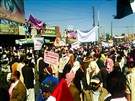Two and half years after its birth, the world’s youngest nation-state, South Sudan, is engulfed in a crisis which has escalated into an armed conflict between two factions in the ruling People Liberation Movement. The political protagonists jockeying for power come from the ranks of the rebels who fought against the Sudanese central government in the 1983-2005 civil war. The war resulted in a loss of two million lives and the displacement of four million people in southern Sudan.
Fighting broke out on 15 December when South Sudanese President Salva Kiir accused then vice president Riek Machar of attempting a coup. Machar and his supporters have in turn accused Kiir of using the coup as a pretext to conduct a purge in the government and the ruling party. In spite of the efforts by the East African regional bloc, IGAD, and the United States to broker a ceasefire in South Sudan, fighting has intensified and caused thousands of death and the displacement of more than 400,000 people, according to the United Nations. Meanwhile, troops from neighboring Uganda are reported to have taken part in combat operations against Machar’s forces. To understand the roots of the current turmoil in South Sudan, Shahram Aghamir spoke with McGill University Associate Professor of political science Khalid Medani. Professor Medani begins by describing the conditions on the ground.
![[South Sudan: Growing violence deepens the humanitarian crisis across the country,©EU/ECHO/ Ludovico Gammarelli. Via Flikr Creative Common]](https://kms.jadaliyya.com/Images/357x383xo/11599773236_3785969ee8.jpg)










